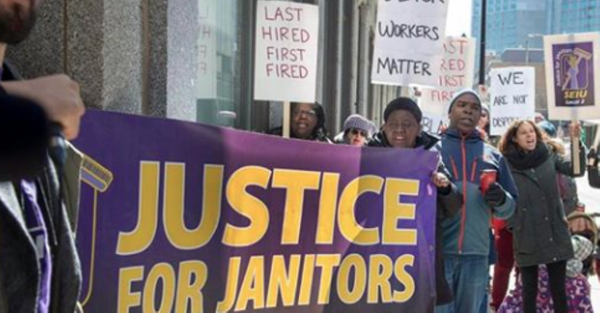2018 began with black janitors being fired in February. In March, what followed was black janitors and their supporters in the streets demanding justice from both the cleaning contractor, Armour Group, and the cleaning company, Deep Down Cleaning.
On May 8 th , HRM workers, mostly African Nova Scotians, demonstrated. They were protesting the lack of action by the city regarding its own report, a leaked employee systems review, detailing an overwhelming pattern of harassment, racism, and other forms of discrimination. The report made 90 recommendations (now 2 years ago), with fewer than half having been dealt with.
Three weeks later, on May 31 st , a human rights tribunal released a report detailing horrendous racism at Halifax transit, twelve years after the original complaint was filed. The perpetrator of these allegations had been reinstated seven years ago.
What do these struggles have in common? Whether it’s in the public or private sector, racialized workers face additional struggles under capitalism.
Armour Group, as the corporation contracting out cleaning services, is a powerful investment firm and real estate developer. The company owns and/or manages several prominent commercial buildings in Halifax’s downtown core and Dartmouth, including RBC Waterside Center, Founder’s Square, Delta Dartmouth Hotel, and the upcoming Queen’s Marque project. This is huge economic power – the power to make financial and social decisions that affect large numbers of people, how and where we live, where we work, who gets to work, and at what wages.
On the other hand, with regards to the municipal government, the experience of public sector workers in HRM shows that racism is deeply embedded in the state infrastructure and permits the flagrant expressions of white supremacy in institutions that are supposedly accountable to citizens.
The struggle of Black workers, whether working in the private sector or in public state institutions like HRM, shows the additional struggle that racialized workers face under capitalism. Capitalism, by definition, exploits the labour of all workers with little care to the human cost, but racialized workers must deal with the additional and profound experience of racism. This racism is not just the product of individual beliefs and prejudices but is part of a 400-year old system of racial exploitation and colonialism.
Solidarity Halifax calls for specific timelines, no later than the end 2018, for the implementation of all 90 recommendations made by HRM’s 2016 systems review.
Solidarity Halifax calls for meeting the demands of the unjustly fired janitors, whether that’s rehiring or immediate financial compensation.
Solidarity Halifax calls for the Nova Scotia Human Rights Commission to develop procedures so that cases are dealt with in a just and expedient manner, unlike the 12 years transit workers waited for a decision.
Finally, Solidarity Halifax calls for all unions to defend racialized members in their struggles against white supremist behaviour.
